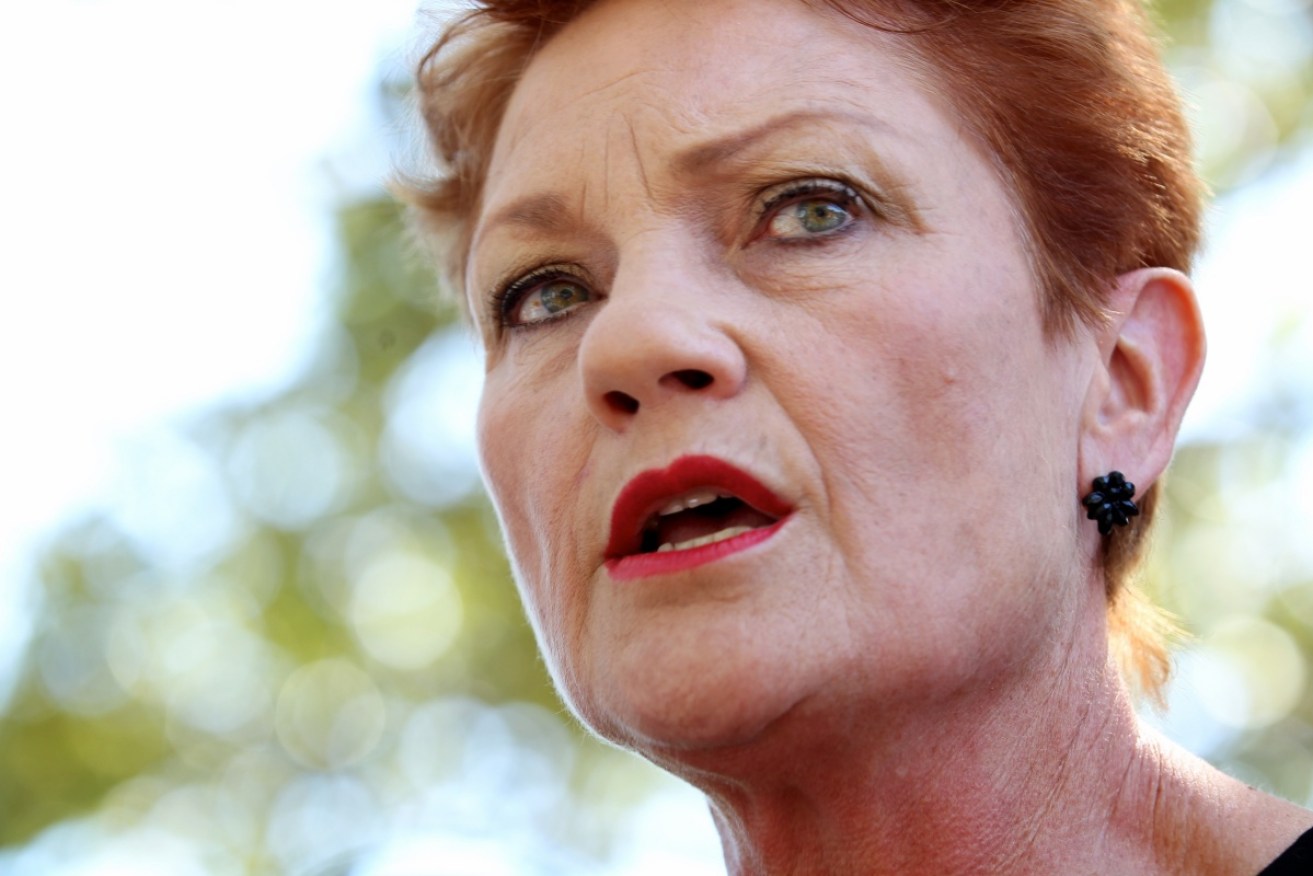Media industry’s future is about to fall into Pauline Hanson’s hands


Pauline Hanson has the ability to make or break historic media reforms. Photo: AAP
Pauline Hanson’s One Nation has emerged with a testicular hold on the future of Australia’s revenue-haemorrhaging home-grown media industry.
With Labor and the Greens opposed to Communications Minister Mitch Fifield’s all-or-nothing media reform bill now before Federal Parliament, the votes of One Nation’s four senators appear decisive.
Later this month the Fifield Bill is expected to pass the House of Representatives through the Coalition’s one seat majority in that chamber.
Having already extracted his pound of goodness through winning an industry constraint on free-to-air TV gambling ads, the Nick Xenophon Team’s three senators are expected to vote for the Bill.
Also expected to support it are senators Jacqui Lambie, Derryn Hinch, David Leyonhjelm (Liberal Democrats), Cory Bernardi (Australian Conservatives) and Lucy Gichuhi (formerly Family First, now independent).
According to number-crunchers for the media industry lobby which descended on Canberra this week, the vote now stands at 37 for, 35 against with One Nation’s four votes hanging in the balance.
The Bill will pass both houses if Senator Hanson and her fellow One Nation senators can be persuaded to abandon their objection to the abolition of the two-out-of-three rule. The rule prevents a single entity controlling a radio, TV and newspaper in a particular licence area.
Media shakedown
The removal of this rule is crucial to Australia’s media shake-up, allowing companies to consolidate in capital city and regional markets.
The industry does have a strong case, as all players are now desperate to survive financially against the rapid reduction of their advertising revenues from so far unregulated global interlopers Facebook and Google and offshore video streamers.

Media executives are on a unity ticket with the government. Photo: AAP
While the industry has formed an historic unity ticket for legislative rescue, just how the public interest in local and regional content is protected remains unknown.
The digital revolution is disrupting audience behaviours as never before leaving many metropolitan and regional print outlets, already downsized to staunch cash flow loss, on the brink of closure.
Young people in particular have abandoned traditional print, radio and broadcast TV and now access media on their mobile phones, through content aggregators and a multiplicity of local and worldwide sources.
Murdoch takes Network Ten, Fairfax merges with Nine?
What can One Nation extract from the Coalition government and the industry in return for this decisive vote?
While Senator Hanson has demanded that the ABC be defenestrated by a $600 million budget cut, the Turnbull government cannot and will not deliver on this demand.
Nor can it call off the police and regulatory dogs, the AFP, the AEC and ECQ now investigating One Nation over allegations of electoral rorting.
Perhaps News Corp could call off its Queensland organ The Courier-Mail in its current pursuit of Senator Hanson through posting leaked internal party conversations which have alerted police to possible criminality.
With One Nation facing a big political survival test of its own in the coming Queensland election, a promise of positive coverage could be just the lever needed in this power play. Too cynical?
At stake for News Corp is the future of already struggling free-to-air Network Ten.

Sky News commentators such as Andrew Bolt could be rescheduled to free-to-air networks in the event of a Sky/Ten merger. Photo: Sky News
Ten is on the brink of receivership. Its survival could be assured if the “two out of three” rule ends and Ten’s value as a strategic asset in a converged entity with News Corp could be achieved.
Also possible for Ten’s survival under full Murdoch ownership would be the cost-savings available by turning the now Murdoch-owned Sky News into the network’s TV news and current affairs service.
And Sky’s phalanx of provocateurs – Andrew Bolt, Alan Jones, Graham Richardson and Chris Kenny – could be rescheduled for free to air as well, boosting their audiences and revenues beyond Foxtel’s current subscriber pay wall.
And Ten under News Corp control would be a complementary asset for televising those top sports which are currently banned to its pay-TV entity Foxtel through the protective anti-siphoning rules.
Also struggling to survive in print is Fairfax Media, whose current suitors, TPG and Hellman & Friedman, are now in due diligence on the financials pending formal takeover bids.
The value of Fairfax shares would be greatly enhanced if the Fifield Bill gets up. Fairfax could merge with the Nine Entertainment network, creating Fairfax/Nine/ Macquarie Radio as a new big domestic player.
Is there perhaps one positive policy reform Senator Hanson could leverage in return for her party’s vote? Yes there is. Let the Australian Parliament impose a 30 per cent local content creation quota on global players who currently have unregulated access to 24 million people.








